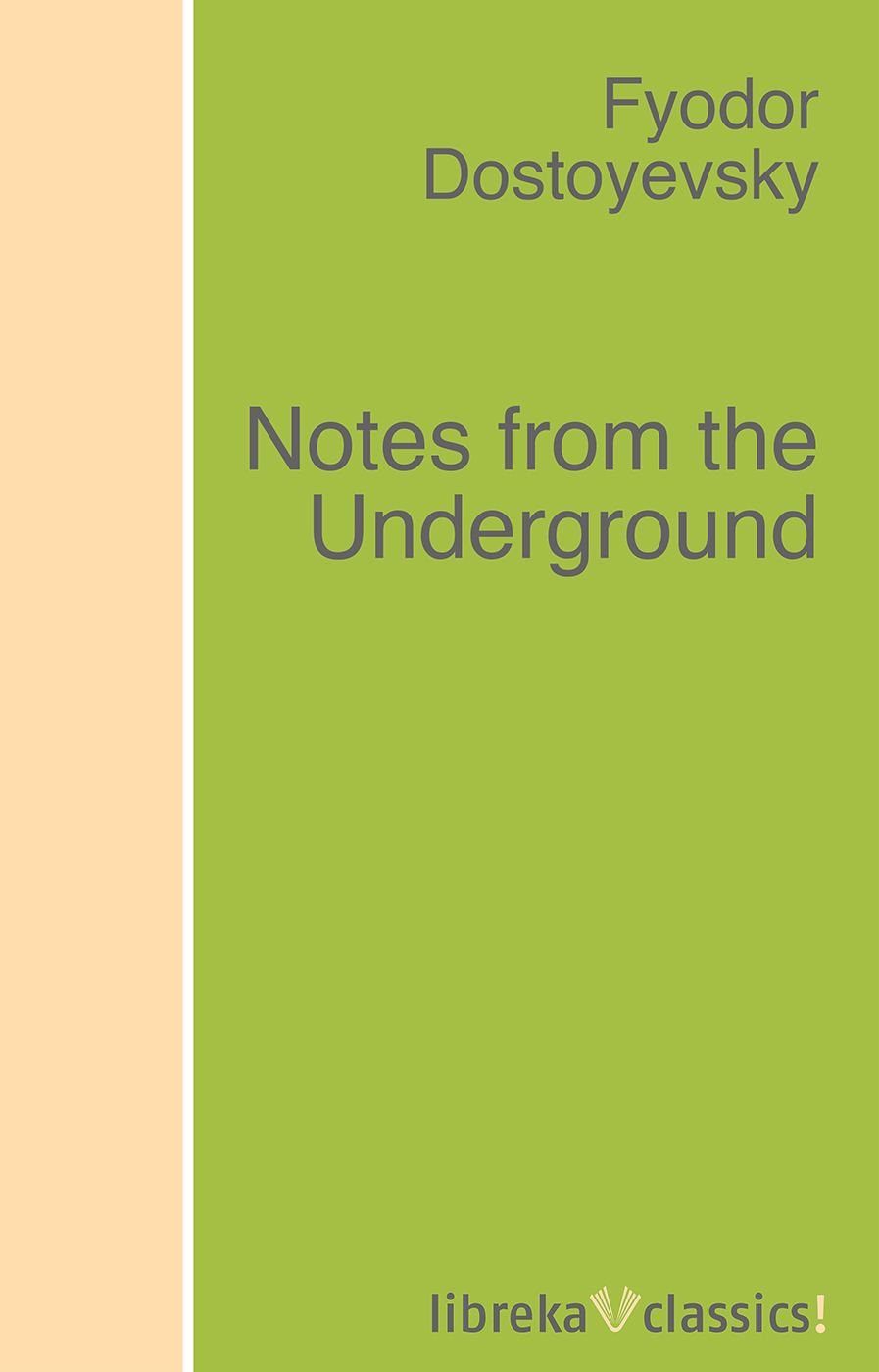
Полная версия
Notes from the Underground


Titel: Notes from the Underground
von Scott Hemphill, L. M. Montgomery, L. Frank Baum, John Milton, René Descartes, Baroness Emmuska Orczy Orczy, Karl Marx, Friedrich Engels, Edgar Rice Burroughs, Unknown, Norman F. Joly, Norman Coombs, David Slowinski, Mark Twain, Henry David Thoreau, Stephen Crane, John Goodwin, Nathaniel Hawthorne, Winn Schwartau, Odd De Presno, Sir Walter Scott, Jules Verne, Mary Wollstonecraft Shelley, United States. Central Intelligence Agency, United States, Canada, Willa Sibert Cather, Anthony Hope, Edwin Abbott Abbott, Charles Dickens, Frederick Douglass, William Shakespeare, Bruce Sterling, Franklin Delano Roosevelt, Jane Austen, Thomas Hardy, Sir Arthur Conan Doyle, Edna St. Vincent Millay, Gene Stratton-Porter, Richard McGowan, Frances Hodgson Burnett, United States. Bureau of the Census, Electronic Frontier Foundation, Robert Louis Stevenson, Anonymous, Jerry Bonnell, Robert Nemiroff, Andrew Lang, G. K. Chesterton, John Bunyan, Sunzi 6th cent. B.C., Harold Frederic, Mary Wollstonecraft, Victor Hugo, René Doumic, Upton Sinclair, Virginia Woolf, George Eliot, Thomas Paine, Benjamin Franklin, Plato, Samuel Taylor Coleridge, Ruth M. Sprague, William Dean Howells, Wilkie Collins, Jean Webster, H. G. Wells, Kate Chopin, Mark Eliot Laxer, Louisa May Alcott, Frank Norris, Edith Wharton, S. D. Humphrey, Henry Hunt Snelling, William Morris, Mrs. Susanna Rowson, Christopher Morley, Sax Rohmer, Oscar Wilde, Gaston Leroux, Henry James, Project Gutenberg, Harriet Beecher Stowe, Various, Robert W. Service, A. B. Paterson, Henry Lawson, Jack London, Laozi, D. H. Lawrence, Julius Caesar, Joseph Conrad, W. Somerset Maugham, George MacDonald, Marcus Tullius Cicero, Virgil, Theodore Dreiser, Giuseppe Salza, Rudyard Kipling, ca. 50 BCE-16 BCE Sextus Propertius, Robert A. Harris, William Wells Brown, graf Leo Tolstoy, Omar Khayyám, Michael Hart, Library of Congress. Copyright Office, Coalition for Networked Information, Geoffrey Chaucer, Adam Lindsay Gordon, Hiram Corson, Robert Browning, Amy Lowell, Rupert Brooke, Joyce Kilmer, John Gower, Saki, Kenneth Grahame, Anna Sewell, Martin Luther, Philipp Melanchthon, National Atomic Museum, Alexander William Kinglake, Charles John Cutcliffe Wright Hyne, Amelia Edith Huddleston Barr, James Branch Cabell, Bayard Taylor, Horatio Alger, Booth Tarkington, Hjalmar Hjorth Boyesen, Michael Husted, Émile Gaboriau, Jerome K. Jerome, Stephen Vincent Benét, Edwin Arlington Robinson, J. Frank Dobie, Joseph Rodman Drake, Eliot Gregory, John Fox, John Muir, Richard Harding Davis, Edgar A. Guest, Mary Roberts Rinehart, Thomas Nelson Page, Sir Walter Alexander Raleigh, Rebecca Harding Davis, Charles Alexander Eastman, Zitkala-Sa, Marie L. McLaughlin, J. M. Barrie, Bram Stoker, Hesiod, Edna Ferber, John McCrae, Anna Howard Shaw, Elizabeth Garver Jordan, Frances Jenkins Olcott, P.-J. Proudhon, Eleanor H. Porter, Mary Hunter Austin, Sarah Orne Jewett, Russell Herman Conwell, Daniel Defoe, Henry Benjamin Wheatley, Ambrose Bierce, Nettie Garmer Barker, Martí Joan de Galba, Joanot Martorell, Oliver Goldsmith, Zane Grey, Winston Churchill, Arthur Machen, L. Cranmer-Byng, Torquato Tasso, H. De Vere Stacpoole, Elizabeth Cleghorn Gaskell, Frank Richard Stockton, Rutherford Hayes Platt, Sara Teasdale, Samuel Smiles, W. E. B. Du Bois, Phillis Wheatley, Elbert Hubbard, Richard Jefferies, George Henry Borrow, Sherwood Anderson, Vachel Lindsay, David Graham Phillips, Harry Houdini, Eugene Field, Gustave Le Bon, Henry Brodribb Irving, William Healy, Mary Tenney Healy, Charles Godfrey Leland, Ralph Parlette, Don Marquis, Richard Le Gallienne, Stewart Edward White, Andrew Steinmetz, Madame de La Fayette, Abbé Prévost, Honoré de Balzac, Charles W. Chesnutt, Sara Cone Bryant, William Booth, James Nasmyth, Enrico Ferri, Joe Hutsko, Miriam Michelson, Oliver Optic, Victor MacClure, Calamity Jane, Gertrude Franklin Horn Atherton, Dinah Maria Mulock Craik, Henry J. Coke, Kate Douglas Smith Wiggin, Victor [pseud.] Appleton, Carlo Collodi, Hugh Lofting, John Philip Sousa, Andrew Dickson White, Joseph Sheridan Le Fanu, Isaac Taylor Headland, Amy Steedman, B. M. Bower, William Tuckwell, Clarence Edgar Johnson, Sinclair Lewis, Rex Stout, Carl R. Maag, Steve Rohrer, Mariano Azuela, Royall Tyler, John Buchan, Ross Kay, J. L. Kennon, Eros Urides, Friedrich Schiller, William Cowper Brann, Adelaide L. Fries, Beatrix Potter, Mary Lamb, Charles Lamb, William Blake, Francis Bacon, Samuel Johnson, Tadashi Nakashima, Sidney Lanier, Edward Jenkins, Harriet E. Wilson, Ellen Craft, William Craft, Sir Thomas Browne, Alexander H. Japp, Guy de Maupassant, Thomas Bailey Aldrich, Snorri Sturluson, William Makepeace Thackeray, Fyodor Dostoyevsky
ISBN 978-3-7429-0560-4
Alle Rechte vorbehalten.
Es ist ohne vorherige schriftliche Erlaubnis nicht gestattet, dieses Werk im Ganzen oder in Teilen zu vervielfältigen oder zu veröffentlichen.
Notes from the Underground
FYODOR DOSTOYEVSKY
PART I
I II III IV V VI VII VIII IX X XI
PART II
I II III IV V VI VII VIII IX X
PART I
Underground*
*The author of the diary and the diary itself are, of course, imaginary. Nevertheless it is clear that such persons as the writer of these notes not only may, but positively must, exist in our society, when we consider the circumstances in the midst of which our society is formed. I have tried to expose to the view of the public more distinctly than is commonly done, one of the characters of the recent past. He is one of the representatives of a generation still living. In this fragment, entitled "Underground," this person introduces himself and his views, and, as it were, tries to explain the causes owing to which he has made his appearance and was bound to make his appearance in our midst. In the second fragment there are added the actual notes of this person concerning certain events in his life.--AUTHOR'S NOTE.
I
I am a sick man.... I am a spiteful man. I am an unattractive man. I believe my liver is diseased. However, I know nothing at all about my disease, and do not know for certain what ails me. I don't consult a doctor for it, and never have, though I have a respect for medicine and doctors. Besides, I am extremely superstitious, sufficiently so to respect medicine, anyway (I am well-educated enough not to be superstitious, but I am superstitious). No, I refuse to consult a doctor from spite. That you probably will not understand. Well, I understand it, though. Of course, I can't explain who it is precisely that I am mortifying in this case by my spite: I am perfectly well aware that I cannot "pay out" the doctors by not consulting them; I know better than anyone that by all this I am only injuring myself and no one else. But still, if I don't consult a doctor it is from spite. My liver is bad, well--let it get worse!
I have been going on like that for a long time--twenty years. Now I am forty. I used to be in the government service, but am no longer. I was a spiteful official. I was rude and took pleasure in being so. I did not take bribes, you see, so I was bound to find a recompense in that, at least. (A poor jest, but I will not scratch it out. I wrote it thinking it would sound very witty; but now that I have seen myself that I only wanted to show off in a despicable way, I will not scratch it out on purpose!)
When petitioners used to come for information to the table at which I sat, I used to grind my teeth at them, and felt intense enjoyment when I succeeded in making anybody unhappy. I almost did succeed. For the most part they were all timid people--of course, they were petitioners. But of the uppish ones there was one officer in particular I could not endure. He simply would not be humble, and clanked his sword in a disgusting way. I carried on a feud with him for eighteen months over that sword. At last I got the better of him. He left off clanking it. That happened in my youth, though.
But do you know, gentlemen, what was the chief point about my spite? Why, the whole point, the real sting of it lay in the fact that continually, even in the moment of the acutest spleen, I was inwardly conscious with shame that I was not only not a spiteful but not even an embittered man, that I was simply scaring sparrows at random and amusing myself by it. I might foam at the mouth, but bring me a doll to play with, give me a cup of tea with sugar in it, and maybe I should be appeased. I might even be genuinely touched, though probably I should grind my teeth at myself afterwards and lie awake at night with shame for months after. That was my way.
I was lying when I said just now that I was a spiteful official. I was lying from spite. I was simply amusing myself with the petitioners and with the officer, and in reality I never could become spiteful. I was conscious every moment in myself of many, very many elements absolutely opposite to that. I felt them positively swarming in me, these opposite elements. I knew that they had been swarming in me all my life and craving some outlet from me, but I would not let them, would not let them, purposely would not let them come out. They tormented me till I was ashamed: they drove me to convulsions and--sickened me, at last, how they sickened me! Now, are not you fancying, gentlemen, that I am expressing remorse for something now, that I am asking your forgiveness for something? I am sure you are fancying that ... However, I assure you I do not care if you are....
It was not only that I could not become spiteful, I did not know how to become anything; neither spiteful nor kind, neither a rascal nor an honest man, neither a hero nor an insect. Now, I am living out my life in my corner, taunting myself with the spiteful and useless consolation that an intelligent man cannot become anything seriously, and it is only the fool who becomes anything. Yes, a man in the nineteenth century must and morally ought to be pre-eminently a characterless creature; a man of character, an active man is pre-eminently a limited creature. That is my conviction of forty years. I am forty years old now, and you know forty years is a whole lifetime; you know it is extreme old age. To live longer than forty years is bad manners, is vulgar, immoral. Who does live beyond forty? Answer that, sincerely and honestly I will tell you who do: fools and worthless fellows. I tell all old men that to their face, all these venerable old men, all these silver-haired and reverend seniors! I tell the whole world that to its face! I have a right to say so, for I shall go on living to sixty myself. To seventy! To eighty! ... Stay, let me take breath ...
You imagine no doubt, gentlemen, that I want to amuse you. You are mistaken in that, too. I am by no means such a mirthful person as you imagine, or as you may imagine; however, irritated by all this babble (and I feel that you are irritated) you think fit to ask me who I am--then my answer is, I am a collegiate assessor. I was in the service that I might have something to eat (and solely for that reason), and when last year a distant relation left me six thousand roubles in his will I immediately retired from the service and settled down in my corner. I used to live in this corner before, but now I have settled down in it. My room is a wretched, horrid one in the outskirts of the town. My servant is an old country-woman, ill-natured from stupidity, and, moreover, there is always a nasty smell about her. I am told that the Petersburg climate is bad for me, and that with my small means it is very expensive to live in Petersburg. I know all that better than all these sage and experienced counsellors and monitors.... But I am remaining in Petersburg; I am not going away from Petersburg! I am not going away because ... ech! Why, it is absolutely no matter whether I am going away or not going away.
But what can a decent man speak of with most pleasure?
Answer: Of himself.
Well, so I will talk about myself.
II
I want now to tell you, gentlemen, whether you care to hear it or not, why I could not even become an insect. I tell you solemnly, that I have many times tried to become an insect. But I was not equal even to that. I swear, gentlemen, that to be too conscious is an illness--a real thorough-going illness. For man's everyday needs, it would have been quite enough to have the ordinary human consciousness, that is, half or a quarter of the amount which falls to the lot of a cultivated man of our unhappy nineteenth century, especially one who has the fatal ill-luck to inhabit Petersburg, the most theoretical and intentional town on the whole terrestrial globe. (There are intentional and unintentional towns.) It would have been quite enough, for instance, to have the consciousness by which all so-called direct persons and men of action live. I bet you think I am writing all this from affectation, to be witty at the expense of men of action; and what is more, that from ill-bred affectation, I am clanking a sword like my officer. But, gentlemen, whoever can pride himself on his diseases and even swagger over them?
Though, after all, everyone does do that; people do pride themselves on their diseases, and I do, may be, more than anyone. We will not dispute it; my contention was absurd. But yet I am firmly persuaded that a great deal of consciousness, every sort of consciousness, in fact, is a disease. I stick to that. Let us leave that, too, for a minute. Tell me this: why does it happen that at the very, yes, at the very moments when I am most capable of feeling every refinement of all that is "sublime and beautiful," as they used to say at one time, it would, as though of design, happen to me not only to feel but to do such ugly things, such that ... Well, in short, actions that all, perhaps, commit; but which, as though purposely, occurred to me at the very time when I was most conscious that they ought not to be committed. The more conscious I was of goodness and of all that was "sublime and beautiful," the more deeply I sank into my mire and the more ready I was to sink in it altogether. But the chief point was that all this was, as it were, not accidental in me, but as though it were bound to be so. It was as though it were my most normal condition, and not in the least disease or depravity, so that at last all desire in me to struggle against this depravity passed. It ended by my almost believing (perhaps actually believing) that this was perhaps my normal condition. But at first, in the beginning, what agonies I endured in that struggle! I did not believe it was the same with other people, and all my life I hid this fact about myself as a secret. I was ashamed (even now, perhaps, I am ashamed): I got to the point of feeling a sort of secret abnormal, despicable enjoyment in returning home to my corner on some disgusting Petersburg night, acutely conscious that that day I had committed a loathsome action again, that what was done could never be undone, and secretly, inwardly gnawing, gnawing at myself for it, tearing and consuming myself till at last the bitterness turned into a sort of shameful accursed sweetness, and at last--into positive real enjoyment! Yes, into enjoyment, into enjoyment! I insist upon that. I have spoken of this because I keep wanting to know for a fact whether other people feel such enjoyment? I will explain; the enjoyment was just from the too intense consciousness of one's own degradation; it was from feeling oneself that one had reached the last barrier, that it was horrible, but that it could not be otherwise; that there was no escape for you; that you never could become a different man; that even if time and faith were still left you to change into something different you would most likely not wish to change; or if you did wish to, even then you would do nothing; because perhaps in reality there was nothing for you to change into.
And the worst of it was, and the root of it all, that it was all in accord with the normal fundamental laws of over-acute consciousness, and with the inertia that was the direct result of those laws, and that consequently one was not only unable to change but could do absolutely nothing. Thus it would follow, as the result of acute consciousness, that one is not to blame in being a scoundrel; as though that were any consolation to the scoundrel once he has come to realise that he actually is a scoundrel. But enough.... Ech, I have talked a lot of nonsense, but what have I explained? How is enjoyment in this to be explained? But I will explain it. I will get to the bottom of it! That is why I have taken up my pen....
I, for instance, have a great deal of AMOUR PROPRE. I am as suspicious and prone to take offence as a humpback or a dwarf. But upon my word I sometimes have had moments when if I had happened to be slapped in the face I should, perhaps, have been positively glad of it. I say, in earnest, that I should probably have been able to discover even in that a peculiar sort of enjoyment--the enjoyment, of course, of despair; but in despair there are the most intense enjoyments, especially when one is very acutely conscious of the hopelessness of one's position. And when one is slapped in the face--why then the consciousness of being rubbed into a pulp would positively overwhelm one. The worst of it is, look at it which way one will, it still turns out that I was always the most to blame in everything. And what is most humiliating of all, to blame for no fault of my own but, so to say, through the laws of nature. In the first place, to blame because I am cleverer than any of the people surrounding me. (I have always considered myself cleverer than any of the people surrounding me, and sometimes, would you believe it, have been positively ashamed of it. At any rate, I have all my life, as it were, turned my eyes away and never could look people straight in the face.) To blame, finally, because even if I had had magnanimity, I should only have had more suffering from the sense of its uselessness. I should certainly have never been able to do anything from being magnanimous--neither to forgive, for my assailant would perhaps have slapped me from the laws of nature, and one cannot forgive the laws of nature; nor to forget, for even if it were owing to the laws of nature, it is insulting all the same. Finally, even if I had wanted to be anything but magnanimous, had desired on the contrary to revenge myself on my assailant, I could not have revenged myself on any one for anything because I should certainly never have made up my mind to do anything, even if I had been able to. Why should I not have made up my mind? About that in particular I want to say a few words.
III
With people who know how to revenge themselves and to stand up for themselves in general, how is it done? Why, when they are possessed, let us suppose, by the feeling of revenge, then for the time there is nothing else but that feeling left in their whole being. Such a gentleman simply dashes straight for his object like an infuriated bull with its horns down, and nothing but a wall will stop him. (By the way: facing the wall, such gentlemen--that is, the "direct" persons and men of action--are genuinely nonplussed. For them a wall is not an evasion, as for us people who think and consequently do nothing; it is not an excuse for turning aside, an excuse for which we are always very glad, though we scarcely believe in it ourselves, as a rule. No, they are nonplussed in all sincerity. The wall has for them something tranquillising, morally soothing, final--maybe even something mysterious ... but of the wall later.)
Well, such a direct person I regard as the real normal man, as his tender mother nature wished to see him when she graciously brought him into being on the earth. I envy such a man till I am green in the face. He is stupid. I am not disputing that, but perhaps the normal man should be stupid, how do you know? Perhaps it is very beautiful, in fact. And I am the more persuaded of that suspicion, if one can call it so, by the fact that if you take, for instance, the antithesis of the normal man, that is, the man of acute consciousness, who has come, of course, not out of the lap of nature but out of a retort (this is almost mysticism, gentlemen, but I suspect this, too), this retort-made man is sometimes so nonplussed in the presence of his antithesis that with all his exaggerated consciousness he genuinely thinks of himself as a mouse and not a man. It may be an acutely conscious mouse, yet it is a mouse, while the other is a man, and therefore, et caetera, et caetera. And the worst of it is, he himself, his very own self, looks on himself as a mouse; no one asks him to do so; and that is an important point. Now let us look at this mouse in action. Let us suppose, for instance, that it feels insulted, too (and it almost always does feel insulted), and wants to revenge itself, too. There may even be a greater accumulation of spite in it than in L'HOMME DE LA NATURE ET DE LA VERITE. The base and nasty desire to vent that spite on its assailant rankles perhaps even more nastily in it than in L'HOMME DE LA NATURE ET DE LA VERITE. For through his innate stupidity the latter looks upon his revenge as justice pure and simple; while in consequence of his acute consciousness the mouse does not believe in the justice of it. To come at last to the deed itself, to the very act of revenge. Apart from the one fundamental nastiness the luckless mouse succeeds in creating around it so many other nastinesses in the form of doubts and questions, adds to the one question so many unsettled questions that there inevitably works up around it a sort of fatal brew, a stinking mess, made up of its doubts, emotions, and of the contempt spat upon it by the direct men of action who stand solemnly about it as judges and arbitrators, laughing at it till their healthy sides ache. Of course the only thing left for it is to dismiss all that with a wave of its paw, and, with a smile of assumed contempt in which it does not even itself believe, creep ignominiously into its mouse-hole. There in its nasty, stinking, underground home our insulted, crushed and ridiculed mouse promptly becomes absorbed in cold, malignant and, above all, everlasting spite. For forty years together it will remember its injury down to the smallest, most ignominious details, and every time will add, of itself, details still more ignominious, spitefully teasing and tormenting itself with its own imagination. It will itself be ashamed of its imaginings, but yet it will recall it all, it will go over and over every detail, it will invent unheard of things against itself, pretending that those things might happen, and will forgive nothing. Maybe it will begin to revenge itself, too, but, as it were, piecemeal, in trivial ways, from behind the stove, incognito, without believing either in its own right to vengeance, or in the success of its revenge, knowing that from all its efforts at revenge it will suffer a hundred times more than he on whom it revenges itself, while he, I daresay, will not even scratch himself. On its deathbed it will recall it all over again, with interest accumulated over all the years and ...
But it is just in that cold, abominable half despair, half belief, in that conscious burying oneself alive for grief in the underworld for forty years, in that acutely recognised and yet partly doubtful hopelessness of one's position, in that hell of unsatisfied desires turned inward, in that fever of oscillations, of resolutions determined for ever and repented of again a minute later--that the savour of that strange enjoyment of which I have spoken lies. It is so subtle, so difficult of analysis, that persons who are a little limited, or even simply persons of strong nerves, will not understand a single atom of it. "Possibly," you will add on your own account with a grin, "people will not understand it either who have never received a slap in the face," and in that way you will politely hint to me that I, too, perhaps, have had the experience of a slap in the face in my life, and so I speak as one who knows. I bet that you are thinking that. But set your minds at rest, gentlemen, I have not received a slap in the face, though it is absolutely a matter of indifference to me what you may think about it. Possibly, I even regret, myself, that I have given so few slaps in the face during my life. But enough ... not another word on that subject of such extreme interest to you.




